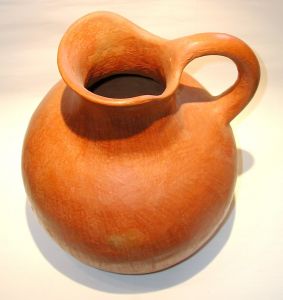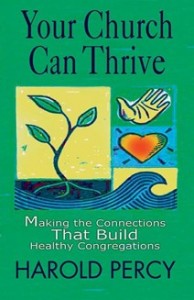 “Do something outside of your comfort zone,” was her instruction, “and come to Thursday’s meeting prepared to talk about it.” At first I struggled with my small group leader’s assignment; not being the kind of person who really avoided uncomfortable things in life. But then a powerful real-life parable played out.
“Do something outside of your comfort zone,” was her instruction, “and come to Thursday’s meeting prepared to talk about it.” At first I struggled with my small group leader’s assignment; not being the kind of person who really avoided uncomfortable things in life. But then a powerful real-life parable played out.
It all started with a call from the office (on my day off). A church staff member informed me that a woman from another church in our denomination had contacted our church to see if I’d be willing to visit her dying husband.
He was in a palliative state and she wanted to know if I could be available to help care for him until he died, and then do his funeral. When this request was first relayed to me (this is hard to admit) I responded in a less than positive way. The family lived over an hour away, and while their church was without a pastor at the time, I didn’t really feel like taking on the added responsibility.
My thoughts were fairly selfish, I know, but the idea of spending weeks or possibly months on the road troubled me. It took a few minutes to reluctantly get my head on straight. Then I returned the woman’s call.
She was quite reticent in making her request, but didn’t know what else to do or where else to go. She said she could pay me for my time. Being the big-hearted guy that I am, I feigned that time and money were not a concern in matters such as these. Then we set up a meeting time for Thursday (convenient for me); three days down the road.
That night I woke up having had a dream about the dying man. I couldn’t recall the details, but I do remember having a strong sense that I needed to visit him right away. After re-scheduling the appointment the next morning, I sat down to begin writing my sermon for the upcoming Sunday; on a film called The Dark Knight (it’s a story about how good and evil reside in all of us, and how there are bigger forces for good holding all of life together, keeping this world; in spite of our often divided hearts). My message came quickly and was uncharacteristically completed in two hours.
This left me a bit more time and space for my palliative sojourn.
And yet I continued to grumble, all the way to this dying man’s house.
Closing the door of my car in front of their home, I remember praying, “Help me get my heart in the right place for this God.” Within minutes, I was sitting beside his bed. The moment I laid eyes on him I could see that death was near; pallid grey skin, purpled bruising, agonized gasping. His arm was elevated on a blanketed bedside table in order to help him breathe.
He was asleep when I entered. But his wife immediately woke him up – for me. I felt like I was intruding on the last bit of peace this man had.
Yet, the moment he awoke, he immediately lifted his dying hand to shake mine. I can still see his laboured effort in slow motion; using almost all of his limited resources he weakly raised his trembling hand to properly greet me. “If a dying man can do that for me,” I thought, “how can I possibly begrudge a one hour trip to come see him?”
He didn’t have a lot of energy for dialogue. For most of the time his wife and I did the talking while he, fading in and out of consciousness, listened in. She handed me a piece of paper with the words John 7:37-38 written on it. “This is the passage he’d like you to preach at his funeral,” she whispered. I opened my bible, searched the text out and then read it.
“On the last and greatest day of the Feast, Jesus stood and said in a loud voice, “If anyone is thirsty, let him come to me and drink. Whoever believes in me, as the Scripture has said, streams of living water will flow from within him.”
Then I asked the man why he chose it. With a weak, gravelly voice he said, “Because we’re the vessels…” To be honest, I didn’t understand what he meant at first. Now I do.
A few minutes later I asked if I could pray with the two of them. Hand in hand in hand I read Psalm 23 – The Lord is my shepherd – and then prayed one of those prayers where even you find yourself listening in to what’s being said. It was one of those times when the Spirit seems to be subtly leading.
Earlier in our meeting the man’s wife had told me that all she really wanted was for him to die peacefully, “In his sleep, at rest.” Building on her desire, I prayed that God would indeed take him soon, but then I added, “And not just in his sleep Lord, but in the middle of a beautiful dream… in the middle of a dream where he’s breathing freely, and running in a wide open space, filled with delight… in the middle of that kind of fully alive and free experience, take him home… and then let that moment live on forever.” For a second the beauty of the image took my breath away.
After finishing the prayer, as I was getting up to leave, I grabbed the man’s hand again and said, “I promise that I’ll do your funeral in a God honouring way. I’ll do the best that I can.”
Then I left for home. Content.
It wasn’t until the next morning that I received the voicemail. The woman had called overnight to let me know that her husband died 7 hours after I’d left, at 11:00 pm. When I heard the words I gasped, and then let out a deep cry. The kind of cry you cry when you feel totally convicted of your selfishness and sin, while at the same time being held by this amazing sense of God’s forgiving grace and goodness. So many ‘what ifs’ ran through my head.
I immediately called the woman back. She saw the timeliness of my visit as nothing short of a miracle. A miracle!
How can that be? Even as my heart was so reluctant and out of line, God was working out his perfect will with a timing that was just right for this woman and her family.
How incredible is that? It truly was a miracle. God it seems -perhaps more often than we know – works in spite of us.
“Because we’re the vessels…”
 Shortly after the 2008 Vital Church Planting Conference, I shared some church planting principles with my sister on a winter camping trip. Among other things, I explained the importance of understanding cultural context, and how evangelism and church planting efforts can be helped or hindered by geography. Months later, for my birthday, she added to the conversation by presenting me with Who’s Your City by University of Toronto business professor Richard Florida. Its cover claimed the book would answer “how the creative economy is making where to live the most important decision of your life,” and its pages contained a treasure trove of demographic data, survey results and surprise revelations for church planters and evangelists called to specific segments of the population.
Shortly after the 2008 Vital Church Planting Conference, I shared some church planting principles with my sister on a winter camping trip. Among other things, I explained the importance of understanding cultural context, and how evangelism and church planting efforts can be helped or hindered by geography. Months later, for my birthday, she added to the conversation by presenting me with Who’s Your City by University of Toronto business professor Richard Florida. Its cover claimed the book would answer “how the creative economy is making where to live the most important decision of your life,” and its pages contained a treasure trove of demographic data, survey results and surprise revelations for church planters and evangelists called to specific segments of the population.



 One afternoon this Spring, I met the Rich Young Ruler. He was a well dressed young professional, who sat next to me and simply struck up a conversation. Eventually the conversation turned to my vocation, drawing out his thoughts on religion: “All religions are the same,” he said, “they all teach the same basic message: Do not murder, do not steal…” He rhymed off most of the Ten Commandments. I listened to his story as he recounted to me the ways he had observed various world religions having failed at keeping the commandments they claimed to believe would save them. Following these commandments did not seem, to him, to be the way to salvation.Taking my cues from Luke 18, I agreed with him that what so many beliefs (including perversions of our own) seem to have in common is that they start with rules and laws, or some other human achievement. There is always something that one must do in order to gain eternal life, spiritual awareness, or whatever end result is sought. This is what the Rich Young Ruler had naturally come to expect, and why he asked Jesus, “What must I
One afternoon this Spring, I met the Rich Young Ruler. He was a well dressed young professional, who sat next to me and simply struck up a conversation. Eventually the conversation turned to my vocation, drawing out his thoughts on religion: “All religions are the same,” he said, “they all teach the same basic message: Do not murder, do not steal…” He rhymed off most of the Ten Commandments. I listened to his story as he recounted to me the ways he had observed various world religions having failed at keeping the commandments they claimed to believe would save them. Following these commandments did not seem, to him, to be the way to salvation.Taking my cues from Luke 18, I agreed with him that what so many beliefs (including perversions of our own) seem to have in common is that they start with rules and laws, or some other human achievement. There is always something that one must do in order to gain eternal life, spiritual awareness, or whatever end result is sought. This is what the Rich Young Ruler had naturally come to expect, and why he asked Jesus, “What must I 





 As a priest, I have had several conversations about The Da Vinci Code. None have been as memorable as the one I enjoyed, not as a priest, but as a rock climber and a friend. On a winter evening in 2004, between runs up the wall at the climbing gym, one of the guys asked if I’d read the popular bestseller. I admitted I had not, and after asking for his impressions, promised that I would read it and get back to him. That simple question, and an honest reponse, initiated a spiritual conversation as thrilling as the climbing itself.
As a priest, I have had several conversations about The Da Vinci Code. None have been as memorable as the one I enjoyed, not as a priest, but as a rock climber and a friend. On a winter evening in 2004, between runs up the wall at the climbing gym, one of the guys asked if I’d read the popular bestseller. I admitted I had not, and after asking for his impressions, promised that I would read it and get back to him. That simple question, and an honest reponse, initiated a spiritual conversation as thrilling as the climbing itself.